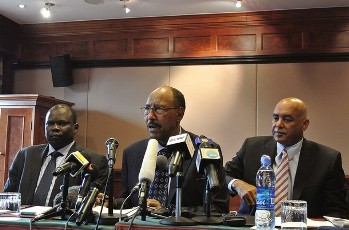Security talks resume as Khartoum indicates flexibility on oil
July 25, 2012 (KHARTOUM) – The negotiating delegations of Sudan and South Sudan resumed in the Ethiopian capital, Addis Ababa, on Wednesday. The negotiations centred on border security issues as they prepare to enter parallel talks on oil today.

South Sudan’s chief negotiator, Pagan Amum, already revealed their proposal to the media this week, saying Juba is prepared to pay Khartoum US$9.10 and US$7.26 per every barrel of oil that his land-locked country export, using two pipelines passing through Sudan.
The offer, according to Amum, also includes an annual financial assistance of US$3.2 billion to help cover Khartoum’s budget gap which was created by losing three quarters of its oil production to South Sudan when it seceded last year.
Sudan, which previously demanded US$36 for every barrel of oil, rejected the announced offer but indicated on Wednesday that it is willing to lower its demand if South Sudan puts up a better deal during the formal talks.
“Our position will be developed in accordance with the new position that has been presented by South Sudan in their comprehensive paper,” Sidiq said.
He added: “Our paper is going to be revised accordingly and we’ll see where we meet and where we differ and we’ll try to approximate the differences as much as we can through the discussions that will take place tomorrow”.
The UN Security Council (UNSC) warned the two sides, in a resolution issued in May following the eruption of their brief war around the oil-producing region of Heglig, to conclude the negotiations by 2 August or face non-military sanctions.
Previous rounds of talks have focused primarily on the creation of a demilitarised zone along the poorly defined borders between the two neighbours, but progress remained slow due to the fact that the parties could not agree on a map defining the desired zone.
As the two parties entered security talks again, Sudan’s official news agency, SUNA, published on Wednesday what it called the paper containing the demands of Khartoum’s negotiators for reaching a deal with South Sudan.
Recalling the provisions of the UNSC resolution and the African Union roadmap on cessation of support to rebels, the security paper demanded that South Sudan withdraws unconditionally from all the areas occupied by its army north of the 1956 border line, defined as “the 14 Mile Area”, “Samaha area in East Darfur”, “Parts of Buhirat Al-Abiad in South Kordofan” and the “the area of Bahar Al-Arab south of Al-Mubram locality in South Kordofan State”.
The paper proposed the “temporary” adoption of the 1/1/1956 map, which has been used since the signing of the Comprehensive Peace Agreement (CPA) between the two sides in 2005, to delimit the demilitarised zone until the joint border demarcation committee defines the borders between the two courtiers.
Sudan’s paper also proposed “the commitment to honesty” when discussing the issue of supporting rebel groups, in reference to previous instances where talks on security collapsed after Khartoum accused Juba of refusing to confess to its backing of the rebel Sudan People’s Liberation Movement North (SPLM-N), which is fighting the Sudanese government in the border regions of South Kordofan and Blue Nile.
Khartoum also accuses Juba of supporting the Darfur rebel Justice and Equality Movement (JEM).
The paper went on to propose that each party disarms and redeploys armed rebel groups of the other out of the demilitarised zone by 50 km. It said that the exercise should be monitored by the joint border monitoring committee.
It also demanded that South Sudan “immediately” severs its links with the SPLM-N and demobilises its forces.
South Sudan denies Khartoum’s accusation of supporting rebel groups. Khartoum maintains that security is its top priority in the talks.
(ST)
